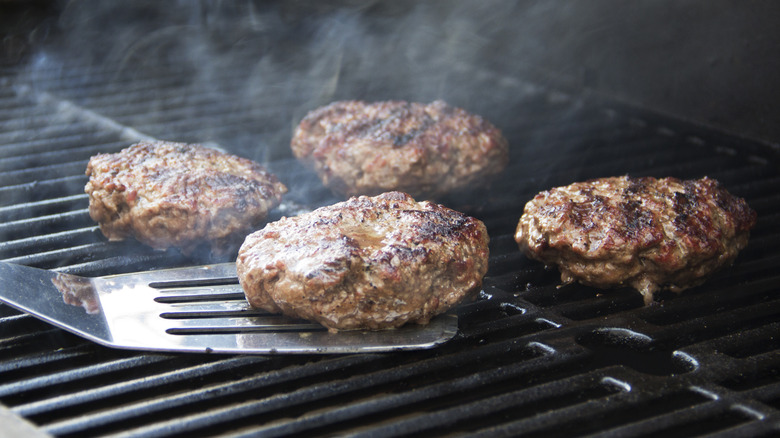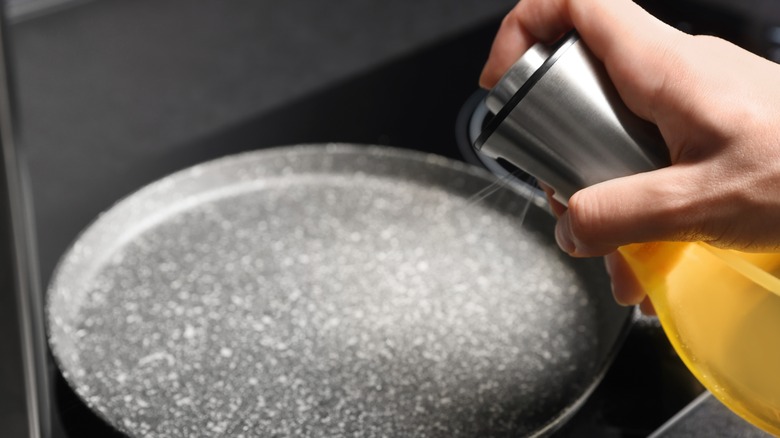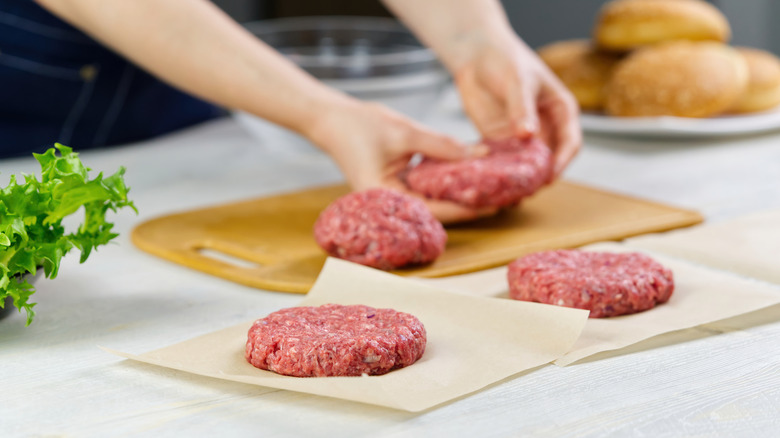The Cooking Oil Trick To Form Hamburgers Without Getting Your Hands Sticky
It's burger night, and everything is almost ready. The fixings are prepped, the grill (or pan) is heating, the buns are separated, and the table is set. All that's left is to season and mold the burgers. This process can be either effortless or a pain in the neck. Sometimes, the meat just sticks to everything and refuses to form beautiful, perfectly shaped patties. Even when it does, your hands get covered in bits of sticky meat and fat. This becomes even more of an issue when blending ingredients for meatballs or meatloaf. This stickiness may not be a major burger mistake, but it sure is annoying.
There are a couple of methods for preventing meat sticking to your hands, particularly if you're moving between tasks (just remember to wash thoroughly after handling any raw meat). Many people recommend wetting your hands with cold water, as this makes it more difficult for the meat to bind to your skin. Alternatively, wearing plastic or nitrile gloves, or wrapping the meat in plastic wrap creates a disposable layer between you and the ground beef. But there's another, perhaps more elegant approach that also works well: cooking spray. That's right, applying a little vegetable or olive oil to your hands will help keep them free from sticky meat, and it'll help you form better patties. (As a bonus, your hands will feel nice and soft for the rest of the day.)
How cooking spray can keep your hands clean
Raw ground beef is "sticky" for a few reasons. First, the blends with higher fat content that help make the best beef for juicier burgers are full of, well, fat and grease. If you've ever grabbed a dollop of butter or shortening for a recipe, you know it's a task to clean it off. Second, muscle tissue contains a crucial protein called myosin. As this protein breaks down, it creates a sticky substance. With steak, myosin is mostly embedded inside the tissue, so it probably won't end up all over your hands. Ground beef, on the other hand, breaks up all of that muscle, exposing the myosin. As the meat warms up when you work the beef into patties, the same protein gets even stickier. (This is also the reason why the less you handle your beef, the more tender it will be.)
Oil acts as a lubricant, making it more difficult for fat and meat to stick to whatever surface the oil covers; this same process is at play when you sauté something with oil. To prevent stickiness when making burgers, just spray or pour a little vegetable oil into the palm of your hand, rub your hands together, and that meat will stick to itself instead of you. You should now be able to shape your patties with far less mess. Make sure you've seasoned them before you oil up, and remember to have a plate ready for the finished patties. Finally, wash your hands thoroughly when you're done.
Which oils work best when handling ground beef
There are many different kinds of food oil out there — sesame, palm, vegetable, coconut, olive, canola — so which works best? In general, meat is best when it's fried in oils with relatively mild flavors and aromas, particularly vegetable or canola oil. Sesame, coconut, and mustard seed oil all have distinctive aromatics and flavors, and while they're commonly used in East Asian and South Asian dishes, they probably aren't best for burgers. There's also the issue of "smoke points," temperatures above which different oils will burn and create "off" tastes. Walnut and flaxseed oils have fairly low smoke points, so you probably don't want to use these when making burgers, either.
The easiest oils to use are canola, vegetable, and olive, each of which has a fairly high smoke point. But the fact is, most oils impart only slightly different flavors to the burger meat, and they're nearly indistinguishable, even when compared side by side (though you will smell the differences on your hands). A chili oil or flavored oil could create a more distinctive flavor note, though, so don't hesitate to experiment!
Pro tips: Pour or spray oil onto your hand over the sink or a large container, in case you miss. Also, season the meat before you oil up; not only is it difficult to handle spice jars with oiled hands, but you'll probably end up with salt all over yourself rather than on the meat. Make sure the oil isn't stale or rancid, as that will affect both the burgers' taste and how your hands smell for hours after.


